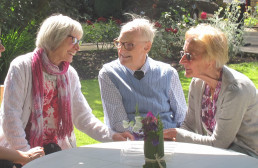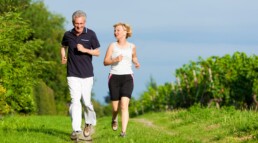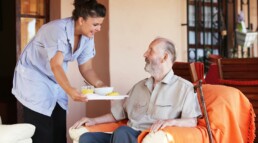Research and impact | By Chris Lines
Extra time: Finding the key to healthier ageing
Humans have always been fascinated by the idea of living longer and have tended to assume the solutions lie with science. But, as City academics are finding, the answers may be rather more wholesome. Community, sport and housing can play life-changing roles in increasing our longevity.
A great many of you might credit your university years as being the best time of your lives, with friends and shared experiences playing a crucial role in those halcyon days. But, as we grow older and reach the later stages of life, sometimes that sense of community gets lost along the way.
According to Age UK, 1.4 million older people in the UK are often lonely. Loneliness is a major issue that is broadly recognised in British society today.
Humans are social beings, and it is widely understood that interactions with friends and family have a major impact on our wellbeing. But we are only just beginning to understand the true benefits of being part of a group, and the detrimental effect of loneliness on length of life.
New research from Bayes Business School (formerly Cass) demonstrates the power of community. In a remarkable key finding, the researchers showed that the increased quality of life that comes from having a social group can add years to a person’s life.
The research team – led by Professor Ben Rickayzen – looked at almshouses, which provide affordable community housing for local people in need. Typically designed around a courtyard, almshouses provide a ‘community spirit’ – independent living but with the benefits of friendship and support when needed.
Analysing up to 100 years’ worth of residents’ records from almshouses in England, the research suggests that living in these communities can reduce the negative impact on health and social wellbeing which is commonly experienced by the older population in lower socioeconomic groups, particularly those individuals living in isolation.

The results are enormously encouraging. They show that living in an almshouse can boost the longevity of its residents by as much as two-and-a-half years compared to their counterparts in the general population.
For several almshouses included in the study, residents can expect to live as long as wealthier members of the general population, despite coming from the most deprived socioeconomic quintile.
This shows that the disparity in longevity and health outcomes could be mitigated even after reaching retirement age, provided a suitable social infrastructure can be put in place.
“The findings from this research are important as they could offer solutions to the social care problems currently being experienced in the UK.”
– Professor Ben Rickayzen, Bayes Business School
Professor Rickayzen added: “We would encourage the Government to invest in retirement communities, such as almshouses, which would be in keeping with their overarching levelling up agenda. While this agenda is commonly associated with enhancing equality on a regional basis, it is important that levelling up should also aim to combat health inequalities experienced by people from lower socioeconomic groups across the country.”
Keep on running
Another Bayes academic interested in longevity is Professor Les Mayhew. His recent work for the International Longevity Centre (ILC) has shown that top-level sportspeople can live more than five years longer than the rest of the population.
Experts have long known that playing sport has myriad health benefits, with physical activity and a sense of community both playing key roles. But, by studying generations of Commonwealth Games medal winners, Les’s research shows what a significant impact top-level sport can have on the longevity of the world’s athletes.
As you watch the efforts of marathon runners and other top athletes in awe, Les hopes you might reflect that many of those crossing the finish line could expect to add years to their lives.
“Although you can’t generally participate at the highest level throughout your life, the benefits evidently stay with you long after you hang up your trainers or your swimming goggles!” he says.

“Perhaps knowing that playing sport increases your chances of a longer life, people of all ages will be encouraged to continue to be physically active throughout their lives.”
– Professor Les Mayhew, Bayes Business School
Housing and ageing
As we increasingly begin to live longer than our predecessors, Les and the ILC published a review into retirement housing in 2022 – The Mayhew Review – which concluded that 50,000 new homes for older people need to be built each year to meet the needs of the ageing population – or one in four of all new homes.
Les was subsequently appointed as a Member of the UK Government’s Older People’s Housing Taskforce, which aims to consider options for the provision of greater choice, quality and security of housing for older people.
Leading the Taskforce is Professor Emerita Julienne Meyer CBE, from City’s School of Health & Psychological Sciences.
Julienne is a specialist in care homes and was one of the co-founders of My Home Life, a collaborative initiative to promote quality of life for those who live, die, visit and work in care homes for older people. In 2015, Julienne was awarded a CBE in the Queen’s New Year Honours for her contribution to nursing and care for older people.

Care homes can have numerous benefits contributing towards an older persons’ longevity, including: safety; companionship; there always being help at hand; regular and nutritious meals; clean and comfortable living environments; medication management; and specialist care.
Addressing the Taskforce’s remit, Julienne says: “We have an ageing population and urgently need to address the lack of supply and quality of older people’s housing. While we want to support older people to live in their own homes for as long as they wish, existing housing stock is unsuitable for many and people are missing out on the health benefits of specialist housing. This needs to change.”
Legacy and impact
Whether you would wish to live for as long as possible, or simply as comfortably as you can in the time you have, City’s pioneering academics are showing – in a multitude of ways – that they will be at the forefront of enabling you to do so.
When academia can directly contribute towards a longer life, or happier living, this is surely research at its most impactful.
Banner image courtesy of The Almshouse Association.